Search the Special Collections and Archives Portal
Search Results

Transcript of interview with Rev. Marion D. Bennett, Sr. by Claytee D. White, January 12, 2004
Date
Archival Collection
Description
Interview with Rev. Marion D. Bennett, Sr. conducted by Claytee D. White on January 12, 2004. Bennett grew up in Greenville, South Carolina and graduated from Morris Brown College before earning his Master of Divinity from the Interdenominational Theological Center in Atlanta. He moved to Las Vegas in 1960 to pastor Zion United Methodist Church, ultimately growing his congregation to over six hundred members. Bennett speaks candidly about the racial tension that the Las Vegas community endured during integration and his fight to establish the Equal Rights Commission in Nevada. In 1973, he ran for the Nevada State Assembly and served for ten years, focusing on quality education and employment along with healthcare and equal rights.
Text
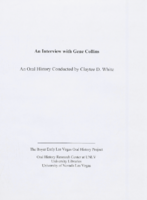
Transcript of interview with Gene Collins by Claytee D. White, August 31, 2000
Date
Archival Collection
Description
Interview with Gene Collins conducted by Claytee D. White on August 31, 2000. Collins grew up in Lake Providence, Louisiana, and moved to Las Vegas in 1966. While attending college, he worked at the Nevada Test Site and trained to be an electrician. He worked with John Patawski and later joined the Aaron Williams Youth Organization and founded a community baseball organization. As a state assemblyman, Collins was instrumental in getting the Martin Luther King Holiday Bill passed along with establishing the Sarah Allen Credit Union. Because of his involvement with the Ministerial Alliance, he was asked to run for president of the NAACP. Under his presidency, he addressed the lack of African Americans in the gaming industry in addition to filing the largest EEOC discrimination suit filed in the state of Nevada against The Mirage Hotel and Casino.
Text
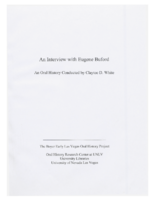
Transcript of interview with Eugene Buford by Claytee D. White, September 12, 2006
Date
Archival Collection
Description
Interview with Eugene Buford conducted by Claytee D. White on September 12, 2006. Buford came to Las Vegas as a child from Birmingham, Alabama. He held a variety of jobs, including washing dishes at the Last Frontier and delivering ice to casinos like the Flamingo and the Stardust, and ultimately retired after thirty-six years with the Post Office. Buford's great grandmother, Mary Nettles, was instrumental in the formation and growth of the NAACP chapter in Las Vegas, and he recalls meetings in her house and his own role as president of the Junior League NAACP. Buford shares memories of historical locations and events such as Helldorado, Block 16, and Carver Park, and several important figures in Las Vegas history, including James B. McMillan, Charles West, Jimmy Gay, Benny Binion, and the mafia.
Text
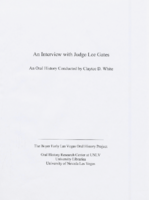
Transcript of interview with Judge Lee Gates by Claytee D. White, December 5, 1996
Date
Archival Collection
Description
Interview with Judge Lee Gates conducted by Claytee D. White on December 5, 1996. Born in Louisiana, Gates moved to Las Vegas around 1960. Following high school, he attended UNLV, where he was a member of the Black Student Association and studied under professor Roosevelt Fitzgerald, who raised his awareness of black history. Gates participated in the civil rights movement and worked as a lawyer before becoming a judge. He discusses Jackson Street, Dr. Charles West, attorney Charles Kellar, and his own involvement with Ruby Duncan's group.
Text

Transcript of interview with Johnny Pate and Jillean Williams by Claytee D. White, March 4, 2004
Date
Archival Collection
Description
Interview with Johnny Pate and Jillean Williams conducted by Claytee D. White on March 4, 2004. As a jazz pianist and composer, Pate was a close friend to legendary singer Joe Williams. Pate and Williams share fond memories of touring with Joe Williams and the Count Basie Orchestra, cruises on the Norwegian line, and playing at the Dunes. Williams recalls moving to Las Vegas with Joe in 1968 and their first home on the Las Vegas Country Club golf course, where they were visited by the likes of Joe Lewis, Perry Como, and Andy Williams. Pate also details his long career, which began with teaching himself piano, tuba, and bass fiddle in the Army, and progressed to arranging and composing, which led over time to record company deals and film scores. Teaching at UNLV, Pate continues the yearly benefit concert to raise money for the Joe Williams scholarship fund.
Text
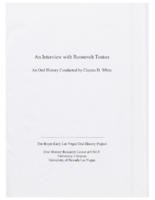
Transcript of interview with Roosevelt Toston by Claytee D. White, July 11, 2006
Date
Archival Collection
Description
Interview with Roosevelt Toston conducted by Claytee D. White on July 11, 2006. Toston grew up in Epps, Louisiana, and came to Las Vegas in the 1950s as a teenager. He describes his experience at Las Vegas High School and the first jobs he held at the Fremont Hotel and the Nevada Test Site. Toston honed his skills at Dana McKay's School of Business, Bell Telephone of Nevada, and in the military. A correspondence course in broadcasting led to jobs at television stations 3 and 8, and ultimately to a position with the Convention Authority in the area of tourism marketing.
Text
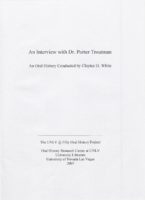
Transcript of interview with Dr. Porter Troutman by Claytee D. White, November 20, 2006
Date
Archival Collection
Description
Interview with Dr. Porter Troutman conducted by Claytee D. White on November 20, 2006. Active in the civil rights movement during college in the 1960s, Troutman became a teacher and later Director of National Teacher Corps, a competency-based teacher education program. His courses at UNLV focus on multicultural education.
Text
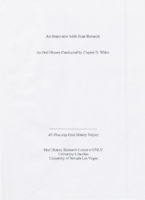
Transcript of interview with Jean Bennett by Claytee D. White, July 8, 2008
Date
Archival Collection
Description
Interview with Jean Bennett conducted by Claytee D. White on July 8, 2008. Bennett's early rock-and-roll career blossomed with music producer Buck Ram, who sold her the legal rights to the Platters in 1966. Bennett's assistant Gayle Schreiber also contributes to the interview.
Text
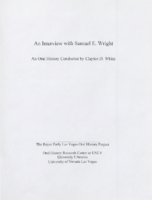
Transcript of interview with Samuel E. Wright by Claytee D. White, October 8, 2010
Date
Archival Collection
Description
Interview with Samuel E. Wright conducted by Claytee D. White on October 8, 2010. Wright candidly discusses growing up during the 1960s racial riots and notes the influence of black activist Stokely Carmichael during that era. He attended Howard University and began a career in public transportation that eventually brought him to Los Angeles and then to Las Vegas with a personal invitation from Mayor Bill Briare. Arriving in Vegas in 1979, Wright worked for the Regional Transportation Commission for twenty-six years, improving systems for a rapidly expanding city. Wright's career ignited his interest in preserving local history and neighborhoods, leading him to start a non-profit organization called PlaceMakers with Las Vegas architect Bob Fielden.
Text
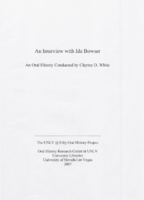
Transcript of interview with Ida Bowser by Claytee D. White, August 30, 2007
Date
Archival Collection
Description
Interview with Ida Bowser conducted by Claytee D. White on August 30, 2007. Born in Tallulah, Louisiana, Bowser came to Las Vegas as a child. Her first job after high school was as a teacher's aide. Later, she worked as a maid at the Sahara and Flamingo hotels. Disenchanted with maid's work, Bowser applied to the welfare office for on-the-job training and began working for the UNLV library, where she remained for thirty-seven years. Bowser recalls Ruby Duncan and the civil rights movement, notable individuals and places, and a discrimination lawsuit.
Text
